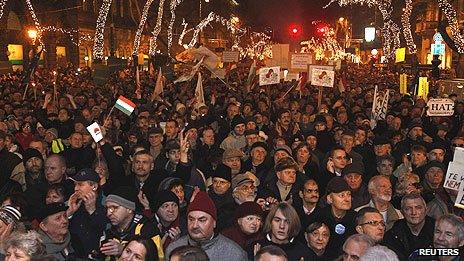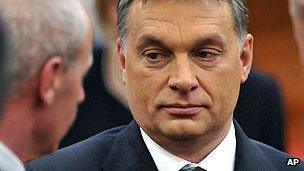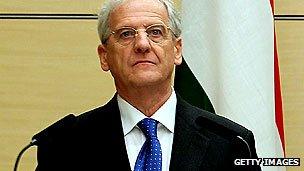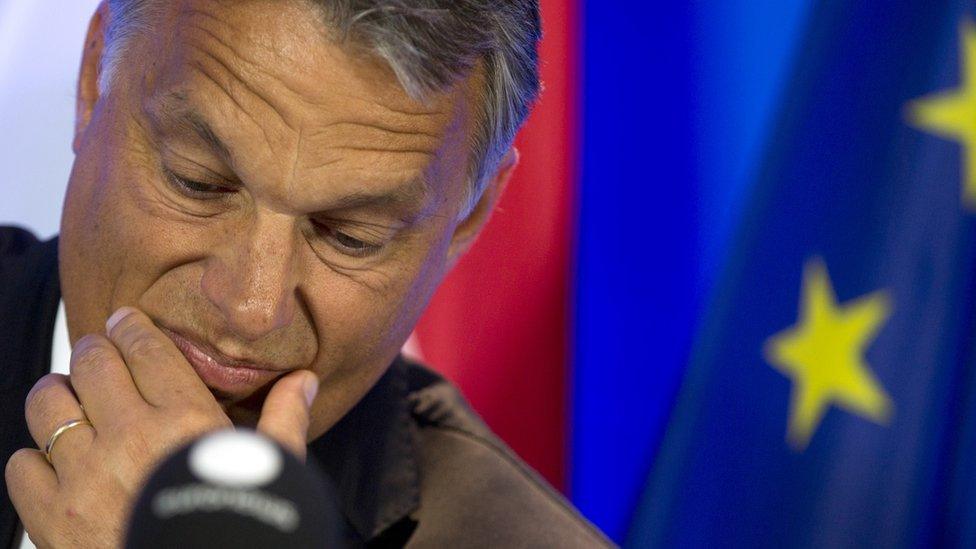Are Hungary's reforms a step too far?
- Published

At least 30,000 people joined recent protests against government reforms
As Hungary's new constitutional and financial reforms meet with strong opposition, the BBC's Nick Thorpe considers the government's record in office since April 2010.
The Hungarian prime minister receives us, the cream - or perhaps, for some observers, the dregs - of the foreign press corps, in a first-floor salon of the parliament building.
Paintings of seven Hungarian kings line the walls above walnut panelling and, through the stained-glass windows above the river Danube, a soft January sun spills yellows and blues on King Bela I's feet.
A lot of water has passed down the river since Viktor Orban first sat down to tea in my front room on the far side of the river 24 years ago, and told me of his plans to set up a rival movement to the Young Communist League.
"I doubt they will let you do it but I'm happy to report your effort," I told him at the time, as we sipped from chipped BBC mugs.
This time, we drink from delicate Herend porcelain decorated with butterflies and flowers. A former liberal himself, Viktor Orban has become the man whom liberals in Europe love to hate.
'Authoritarian' rule
For an hour-and-a-half, we speak, off-the-record. There is a lot to go through.

Viktor Orban promised 'modest' rule when he came to power in 2010
His government stands accused of autocratic, even authoritarian, moves to take over state institutions - most seriously the national bank - of trampling human rights underfoot and of destroying democratic checks and balances.
When the tape recorders go on for the last few minutes of our meeting, he quotes the Rolling Stones - "I Can't Get no Satisfaction".
The song came out in 1965 when he was just two years old. Its lyrics sum up his own frustration, he says, and that of millions of Hungarians that the change of system, begun in 1989, was never completed.
That was the reason for Hungary's brand new constitution, which came into force on the first of January, he explains.
A constitution which, he and his party believe, finally launches Hungary on the right road.
At his first news conference after winning the elections in 2010, I asked him what guarantees he could offer that his government would govern responsibly.
He had just won an unprecedented two-thirds majority in Parliament. Opposition parties, with the exception of the far right, were decimated.
"Nothing to worry about," was his reply. "The parliamentary opposition, the media, all the institutions of state would no doubt do their job."
In a separate speech, he promised a decisive - but also humble and modest - rule.
President replaced
But the warning bells began ringing almost immediately.
The independent-minded President of Hungary, Laszlo Solyom, whose name means kestrel, would have been the perfect person to make sure the government did not get drunk on its own power - to lock the bottle in the cupboard, as it were.

Laszlo Solyom left office in August 2010
As a former head of the constitutional court and as the main architect of the new democratic system in Hungary after 1990, this bird knew the lie of the land like no other.
But he had a habit of using his constitutional power to send laws back to parliament.
"This is not a time for checks and balances," a close associate of the prime minister told me in confidence in the autumn of 2010, as we sipped the golden wines of Tokaj and watched the golden leaves fall in the gathering dusk.
"Solyom is a symbol of the last 20 years. We see him as an obstacle to reform."
And Hungary needed reforms, everyone agreed. So he was replaced by a tamer bird, President Pal Schmitt, who has yet to veto a single law.
Media restrictions
Viktor Orban's next move proved equally costly.
He shot the messenger who might have taken his message to his own people and to the wider world.
His Fidesz government passed some of the most restrictive media legislation in Europe - and presented your average journalist with the perfect story.
The plucky reporter staggers into his own editorial office, blood streaming from a shoulder wound, screaming, "My God, I've been hit. Someone give me a keyboard."
It was the perfect story - to be martyred and paid for it.
The media law has not been effective in addressing the genuine failures of the media in Hungary today - the protection of individuals from hate campaigns, the turgid tabloid torrent - but Mr Orban lost many friends when he tried to "make order" in the media.
Worst of all, he merged public service radio, TV and the state news agency into a single centre. The peculiar genius of each - to tell the story in its own way - was lost.
Back in the sunlit salon, our 110 minutes with Europe's chief bogeyman were coming to an end.
Might he retract specific laws, even parts of his precious constitution, to get the badly needed IMF loan, we asked.
"No pressure, just arguments," Viktor Orban repeated.
"If convincing arguments are put forward, we will be open - and flexible - on all points."
How to listen to From Our Own Correspondent:
BBC Radio 4: A 30-minute programme on Saturdays, 1130.
Second 30-minute programme on Thursdays, 1100 (some weeks only).
Listen online or download the podcast
BBC World Service:
Hear daily 10-minute editions Monday to Friday, repeated through the day, also available to listen online.
Read more or explore the archive, external at the programme website, external.
- Published4 September 2015

- Published29 December 2011
